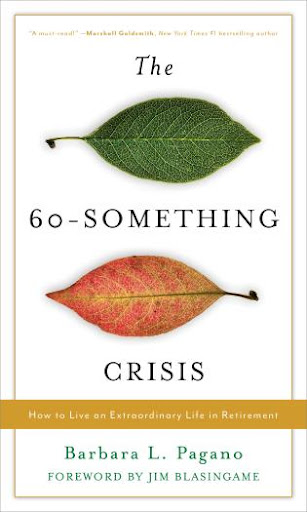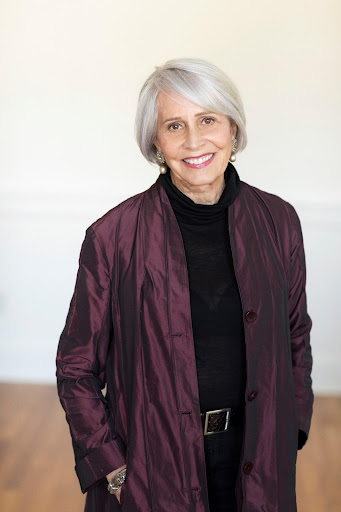 Self-help teaches how to invest in yourself and live a life of fulfillment in retirement
Self-help teaches how to invest in yourself and live a life of fulfillment in retirement
Knoxville, TN –
When the honeymoon of retirement is over, many individuals accept much less than life has to offer and confuse complacency with true happiness. Diminished self-confidence wears down motivation and the potential for all that life could be is lost. The voice of a new way of living in the last third of life, Barbara Pagano developed a guide for others to create a post-midlife lifestyle of work and freedom. She uses her research and years of experience in leadership development to expose how we can reshape our life after 60. Introducing: “The 60 Something Crisis: How to Live an Extraordinary Life in Retirement” (Rowman & Littlefield, 7/19/22).
Circumvent the tired and conventional approaches of finding purpose, passion, or happiness to discover a path of fulfillment after 60 by pursuing desires, mastering risk-taking, and expanding horizons with confidence.
The crisis of unfulfilled lives unfolds gradually, often with acquiesced boredom and a flimsy search for purpose. Our relevancy comes into question, or we succumb to the idea that the future will be one of slow-moving ambition and then an even slower glide into comfort as the flush of freedom fades. We can change this outcome.
The 60-Something Crisis is the first book to circumvent the tired and conventional approaches of finding purpose, passion, or happiness. It presents a clear, practical framework through four portals—geography of place, yield, kinship, and freedom—to navigate and support future well-being and happiness. Readers will learn how to pursue desires, not roadmaps, to increase self-confidence and master risk-taking, and will discover the power and potential of investing in themselves at this time of life.
“The 60-Something Crisis: How to Live an Extraordinary Life in Retirement”
Barbara Pagano | Rowman & Littlefield | Nonfiction
Hardback | 978-1-5381-5575-2 | $34.00
e-book | 978-1-5381-5576-9 | $32.00
 BARBARA PAGANO: Working until 85 – not 65 – is the “new retirement” for Pagano and millions of others. Volunteering, traveling just to travel, and not earning money – it doesn’t work for her and it doesn’t work for millions of others. Her previous career paths have all been about teaching and facilitating change in others. Her first company, Executive Pathways, focused on excellence in leadership and performance. Having coached over 3500 executives to higher levels of success, the speaking platform wooed her to share that information with large audiences – immensely enjoyable and sometimes daunting! You better have something smart to say to a group of successful CEOs and entrepreneurs or they will beat you with invisible sticks for wasting their time!
BARBARA PAGANO: Working until 85 – not 65 – is the “new retirement” for Pagano and millions of others. Volunteering, traveling just to travel, and not earning money – it doesn’t work for her and it doesn’t work for millions of others. Her previous career paths have all been about teaching and facilitating change in others. Her first company, Executive Pathways, focused on excellence in leadership and performance. Having coached over 3500 executives to higher levels of success, the speaking platform wooed her to share that information with large audiences – immensely enjoyable and sometimes daunting! You better have something smart to say to a group of successful CEOs and entrepreneurs or they will beat you with invisible sticks for wasting their time!
Follow Barbara Pagano on social media:
Facebook: @Barbara L Pagano | Twitter: @blpagano | LinkedIn: @Barbara Pagano
www.yourextraordinarylifeafterretirement.com
In an interview, Barbara Pagano can discuss:
- The idea of “new retirement” and the pressure we put on retiring at the right age
- Her own experiences with retirement and why it didn’t work for her
- Life stages and how we can best support each stage
- Mid-life crisis, why they happen, and how we can combat them
- The framework for her approach to life after 60
- How to ain the feeling of relevancy throughout life
- Her extensive background and founding of Executive Pathways
- The experience of coaching over, 3500+ execulative to high levels of success
An interview with Barbara Pagano
1. When did you first realize typical “retirement” wasn’t for you?
In over 2000 nautical miles on a sailboat with my daughter, we never got lost at sea. When there is nothing to see but water all around you, it’s easy to lose your bearings. But it turns out, I’d lose my bearings in a different way. Long after I learned the importance of waypoints and markers, long after I successfully navigated deep waters, I got lost on land.
It was a staggering surprise.
When I turned 65, I had good health and I had choices. It seemed all I had to do was figure out the rest of my life. What do I want to do now? How can I live my best life? Every morning I sat on my office couch with good intentions and a cup of coffee, and believe me, I tried hard to figure that out. Despite graduate degrees in human behavior and many successful crossings into new life stages (I even pre-planned a very successful mid-life crisis for myself in my mid-forties), everything about this age I was now didn’t fit me. Even the word “retirement”—the word we most use for a pivot, a time in life beginning when we turn 65—didn’t fit me. Did I want to keep working? Work in a different way? Find new work? Travel? Volunteer? Bike the Pyrenees? Babysit the grandkids?
It shouldn’t have been so hard, but it was. I never got depressed, but I was majorly confused about how to navigate the last third of my life. And I came to hate the question, “What’s next?”
I wasted close to three years. That’s precious time folks. In due course, I ended up in libraries, bookstores, and in classes and seminars to become a consummate learner of the current literature on aging, retirement, un-retirement, productive longevity, well-being, and happiness. I interviewed over 200 pre-retirees and retirees.
Just like on that sailing endeavor, I learned something new every day. I buckled down, found a new way to ground myself and create a life in retirement—not just a ho-hum, be-thankful-for-what-you’ve-got life, but an extraordinary one by my standards.
2. Why do you think retirement is the way it is? Can you talk about the pressure put on people to retire at a certain age?
The contribution of longevity creates a new life stage of an extra 25-30 years. Wow. How do we begin to plan a quality, satisfied, century-old life?
Truth is we are not good at living long, productive lives. Many use an old 3-stage map – education, work then retirement – that will not work anymore. We know this because the distance between happy and happier is felt by those in their 70s, 80s and 90s is evident. We have underestimated not only ourselves and our potential, but the sheer complicated force of one of the hardest transitions in life.
Sixty-year-olds facing life after career, as well as those who have already retired, often succumb to the idea that a new future will be one of slow-moving ambition and then an easy slow glide into contentment as the flush of freedom fades. This sets up a disheartening situation for a new phase that finishes a lifetime.
Retirement is not a feeling. The realness of retirement and what it means for us needs our full attention.
We can all do better.
3. Can you explain a bit about how your ideas differ about retirement?
Having it all is a concept that will mean different things to different people. In any case, one thing is certain: the person in charge of finding a new life and lifestyle will be you—not that younger 20-, 30- or 40-year-old you. But this older you. The one looking at the shorter road ahead. The one with baggage. The one with memories of high-flying moments. The one who has been let down. The one carting around potential, dormant dreams and a promise of time for the best life, better than ever imagined.
You are the only answer, and there is no shortage of advice on how to begin. The drums beat loudly for finding purpose, following passion, and seeking authenticity. What does all this mean and where does it leave us? What if we can’t find our purpose? How do we consciously come to know and understand our character, feelings, motives and desires so we can live an extraordinary last third of life?
In other words, “How do we make the most of this time ahead?” Accountability, self-awareness, imagination, and action are key features now in a life that matters. The drumbeat for purpose and passion has faded.
4. How does this method better support life after 60?
Most of us treat retirement as an event—a happening where work is over or revised. But retirement is not an event nor a feeling. Retirement is a late-in-life process that comes with an additional series of events conspiring together to give a nice, big bucking bronco ride. At no other time of life could these events happen, and their timing initiates a passage that can be chaotic, emotional and intense. These signature events are obvious because of age. They are quiet, but not soft in affect.
Transitions can be noble, beautiful or exciting. And hard. The three changes accompanying the life stage of retirement begin in your sixties.
Three Signature Events That Accompany Retirement:
- Last Chance
- 30-Year Bonus
- The Young Old
5. What is the purpose of this book?
Finding your purpose and passion to help you create a life is highly overrated, conventional, and tired advice. Trying to narrow down your purpose or identify passion as a precursor to actionable living can get you nowhere.
Is there a better way? There is. Forget your purpose. Ignore the search for a passion to center your life. Don’t write a purpose statement, narrow your passions or mind-map your future life.
Instead, start with a big dose of self-awareness, add knowledge and tools, understand what’s ahead and ask, “What do I need to know and what do I need to do now?”
The triumph- an extraordinary life – can start at any age. You don’t need more therapy, more education, a new or perfect job, a spiritual advisor or a sabbatical. What is essential is to step up and give life your best shot.
This book is your guide – a practical nuts-and-bolts guide to crack open the ‘what if’s’ of your own life, under your own steam. You’ll be inspired.

A former award-winning journalist with national exposure, Marissa now oversees the day-to-day operation of the Books Forward author branding and book marketing firm, along with our indie publishing support sister company Books Fluent.
Born and bred in Louisiana, currently living in New Orleans, she has lived and developed a strong base for our company and authors in Chicago and Nashville. Her journalism work has appeared in USA Today, National Geographic and other major publications. She is now interviewed by media on best practices for book marketing.

